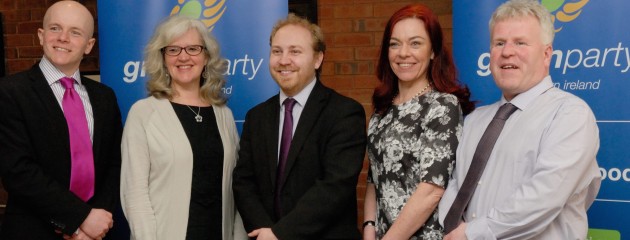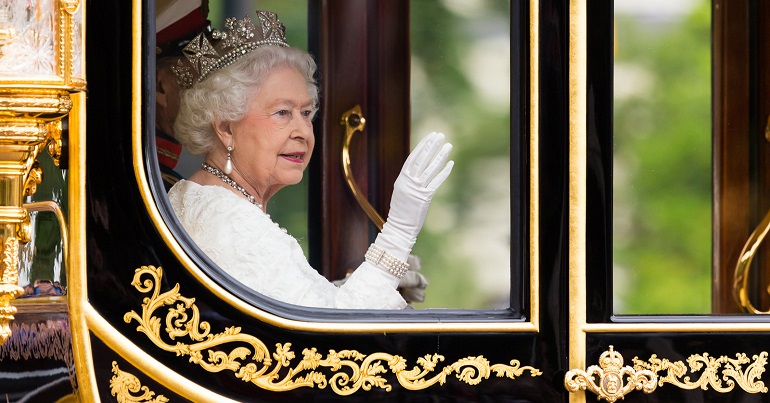“Troubling the troubles” – the Northern Irish Greens are an inspiration to us all

Where the Short Strand’s Mountpottinger Road meets the Albertbridge Road, the houses have thick steel mesh over their windows and, at first, no one answers our knocks. We are only metres away from the interface, but it’s clear which side we’re on. The small park across the street has not only the word “Green” over its gate, but also the Gaelic “Glass”. Each house has a friendly “Fáilte” and an Irish name carved on a wooden sign by the door, and Sinn Fein have begun to mark their election territory with a large green and orange sign on each lamp-post. Along one side of the park runs a vast fence designed, like the metal over the window, to intercept rocks and bottles.
Metres away, Loyalist Cluan Place and the Albertbridge Road are just as clear about their affinity, with ageing Union Flags slumped in the still air. I’d agreed to go to Belfast at short notice for the conference of the Green Party of Northern Ireland. In exchange, I asked Ross Brown, the only Green on Belfast City Council and the Westminster candidate in the East of the city to take me out canvassing in the toughest part of his constituency. Despite sharing my festering conference hangover only half seen off by a disappointing fry-up, he kindly obliged.
It’s a universal law of knocking on doors that the ‘rougher’ the reputation of area, the nicer the people, and the East Belfast Interface is no exception. On both sides of the divide, Ross was greeted with a warmth and a level of interest you rarely find among the “I’m-too-busy” middle classes. On both sides, we found people who had voted Green in the European elections last year – for Ross himself. And on both sides, ultimately, we found the same concerns: a desire to move beyond sectarian games, to a normal politics.
Not once did anyone ask what position Greens take on the constitutional question. When Ross repeated his priorities – fighting cuts, a living wage, bringing a jobs hub back to East Belfast, people on both sides agreed that this is what the constituency needs.
Despite this, when they go into the polling booth in May, I would guess that most of the people we spoke to will likely vote for either Sinn Fein or the DUP. The seat is currently held by the cross-community Alliance, but for the voters we spoke to, the risk of ‘the other side’ getting more power than theirs feels tangible. They may hate this race to the bottom, but they can’t afford to lose it.
The conference itself the previous day impressed me enormously. The Green Party of Northern Ireland has seen what they call a “Wee Green Surge”, and is now approaching an unprecedented 400 members. This may seem tiny, but it’s nearly treble what it was this time last year, and is not very different from the membership of the Scottish Greens when I first joined in 2001.
From one perspective, they are a candle in a hurricane, refusing to be blown out despite breaking all of the rules of what is by far the most impenetrable political fortress in the UK and possibly the EU. From another, they are exactly what thousands of people in Northern Ireland are looking for: after all, if one corner of Europe needs a transformation of its politics and economy, this is it.
The party has one MLA, its leader: Steven Agnew. Steven has the disarming charm that I guess you had to learn if you were a small teenager growing up in a rough Loyalist estate during the Troubles – the kind of guy who manages to hold his ground without making too many enemies. He may be on the brink of securing the second ever piece of Green legislation in the UK: a Bill requiring government departments to collaborate when dealing with children.
His speech to the conference explained how he had used his influence to push Sinn Fein into opposing their own proposed welfare cuts; he denounced other parties for running on an issue, the constitution, which the Good Friday Agreement has taken out of the hands of MPs, and made a widely praised apology for how he had responded to questions around the Green Party of England and Wales’ policy on membership of proscribed terrorist groups – an issue which has much more resonance on that side of the Irish Sea.
Deputy Leader, Clare Bailey, strikes a different tone. A prominent feminist activist in one of the few parts of the EU where women still don’t have the right to choose an abortion, she represents the strong need for a broad Green party, willing to take controversial positions in order to move the debate forwards. Likewise, Ross Brown, my guide and a Young Green, cuts an impressive figure: an energetic former Treasury economist whose election is testament to what you can do if you are willing to knock on enough doors. The pundits on Ulster’s Sunday Politics said of him “he’s young, he’s articulate, he’s impressive”. They’re right.
The person who impressed me most though is the godfather of the Northern Irish Greens. If you ever meet a Green member from the Province, they’ll almost always tell you that they were recruited to the party by an energetic political theorist at Queens University called John Barry.
It’s a measure of John’s political skill that he manages to represent a staunchly Unionist area despite having a Catholic name and thick Dublin accent. In his report to the conference, he talked about how he likes to “trouble the troubles” – calling the city “Londonderry” despite coming from Dublin, watching the look on the faces of his DUP colleagues when he declares “I am a proud unionist… a trade unionist” and pledging his loyalty only to the rainbow flag of peace. He has brought proposals that his council support equal rights to marriage, and promised to bring them back again, and again and again, “until we have equality in Northern Ireland”.
John, a socialist who probably fits most closely into the Gramscian school, has built this party one person at a time, and the power of his report meant I watched it through the blur of quiet tears. Northern Ireland needs not passivity, but new passions.
At three o’clock in the morning after the conference, I found myself at a house party in East Belfast, taken there post-pub, post-club by some fellow conference goers. I spent an hour talking to one man, perhaps 25. After some rugby chat, he told me that Northern Ireland needed to move beyond sectarianism but then said, firmly, that he would die before being ruled from Dublin. He’s gay, but will be voting for the vocally homophobic DUP. That’s his history.
If Green parties exist to help societies democratically navigate their path out of the woes of the past, then there are few places that this work is more needed than Northern Ireland. And there are few Green Parties by whom I’ve been more impressed than the ragged collective chapping on doors across Ulster: the only European Greens I know of who have had to face down threats from paramilitaries, to represent both sides of a still bitterly divided community and who do it with charm, humour, and enough confidence in their own ideas to have no fear of collaboration.
Next year is the election for the Northern Irish Assembly. Ross is standing again in Belfast East, and Clare Bailey is standing in Belfast South. With enough support, they could both win, and treble Green representation in the Assembly. To do that, they need a paid staff member. They say that’ll cost £900 a month. It seems to me that Greens in Scotland, England and Wales could, between us, easily cover that. I’ve signed up to give £10 a month. Join me.



Leave a Reply